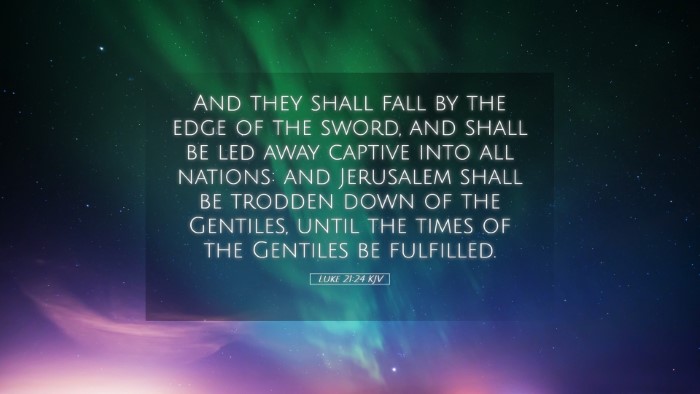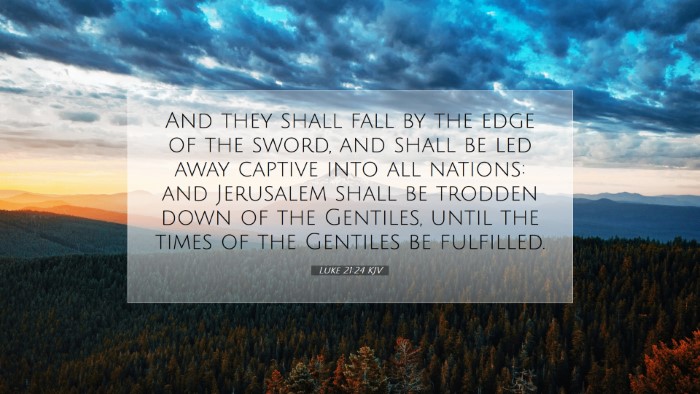Commentary on Luke 21:24
Verse Reference: Luke 21:24 - "And they shall fall by the edge of the sword, and shall be led away captive into all nations: and Jerusalem shall be trodden down of the Gentiles, until the times of the Gentiles be fulfilled."
Contextual Background
The context of Luke 21 involves Jesus’ prophetic discourse regarding the end times and the fate of Jerusalem. This chapter parallels the eschatological discourses found in the other Gospels, particularly Mark and Matthew, which also outline the tribulations that would come upon the nation of Israel and the subsequent desolation of Jerusalem.
Historical Significance
Matthew Henry emphasizes the weight of this prophecy within the historical narrative of Israel. He points to the destruction of Jerusalem in 70 AD, a fulfillment that is not merely physical but also spiritual in the sense that it represents God’s judgment. This period marks the beginning of the Jewish diaspora, aligning with the prophetic declaration about captivity and oppression.
Theological Implications
Albert Barnes notes the theological implications of Jerusalem being "trodden down of the Gentiles." This illustrates a profound transition where God’s chosen city becomes a metaphor for rejection and judgment. The "times of the Gentiles" signify a phase in divine history where the Gentile nations will have preeminence, which points to the eventual restoration and fulfillment of God's promises to Israel.
Exegesis of Key Phrases
- “Fall by the edge of the sword” - This phrase indicates the violent end that many would face, highlighting the seriousness of the prophetic warning and the resulting paroxysms of judgment upon the nation.
- “Led away captive into all nations” - This speaks to the dispersion of the Jewish people, a direct consequence of their disobedience and an essential part of God’s redemptive plan throughout the ages.
- “Trodden down of the Gentiles” - Indicative of the dominance of non-Jewish powers over Jerusalem, symbolizing both a spiritual and physical desolation. This also presages a time of waiting for God’s sovereign intervention.
- “Until the times of the Gentiles be fulfilled” - This phrase opens a window to the eschatological future, where there exists a determined period during which God allows the Gentile nations to dominate.
Hope in Fulfillment
Adam Clarke discusses the hopeful outlook of this prophecy. He points out that despite the grim predictions, the phrase "until the times of the Gentiles be fulfilled" implies a restoration that is divinely orchestrated. It suggests that God is not done with Israel or Jerusalem; rather, His plans include bringing them back to prominence in divine eschatology.
Applications for Contemporary Believers
This verse serves as a sobering reminder for contemporary believers regarding themes of judgment, mercy, and eventual restoration. The balance of prophetic warning and redemptive hope should motivate believers to live in holiness and anticipation of God's sovereignty in all circumstances.
Conclusion
In conclusion, Luke 21:24 provides profound insights into God's overarching plan for humanity, history, and the Jewish people. It challenges scholars and believers alike to consider the implications of judgment and grace throughout Scripture. By understanding the historical and theological significance of this verse, one can appreciate the complexity of God's redemptive history and the ultimate assurance of His promise to restore His people.


